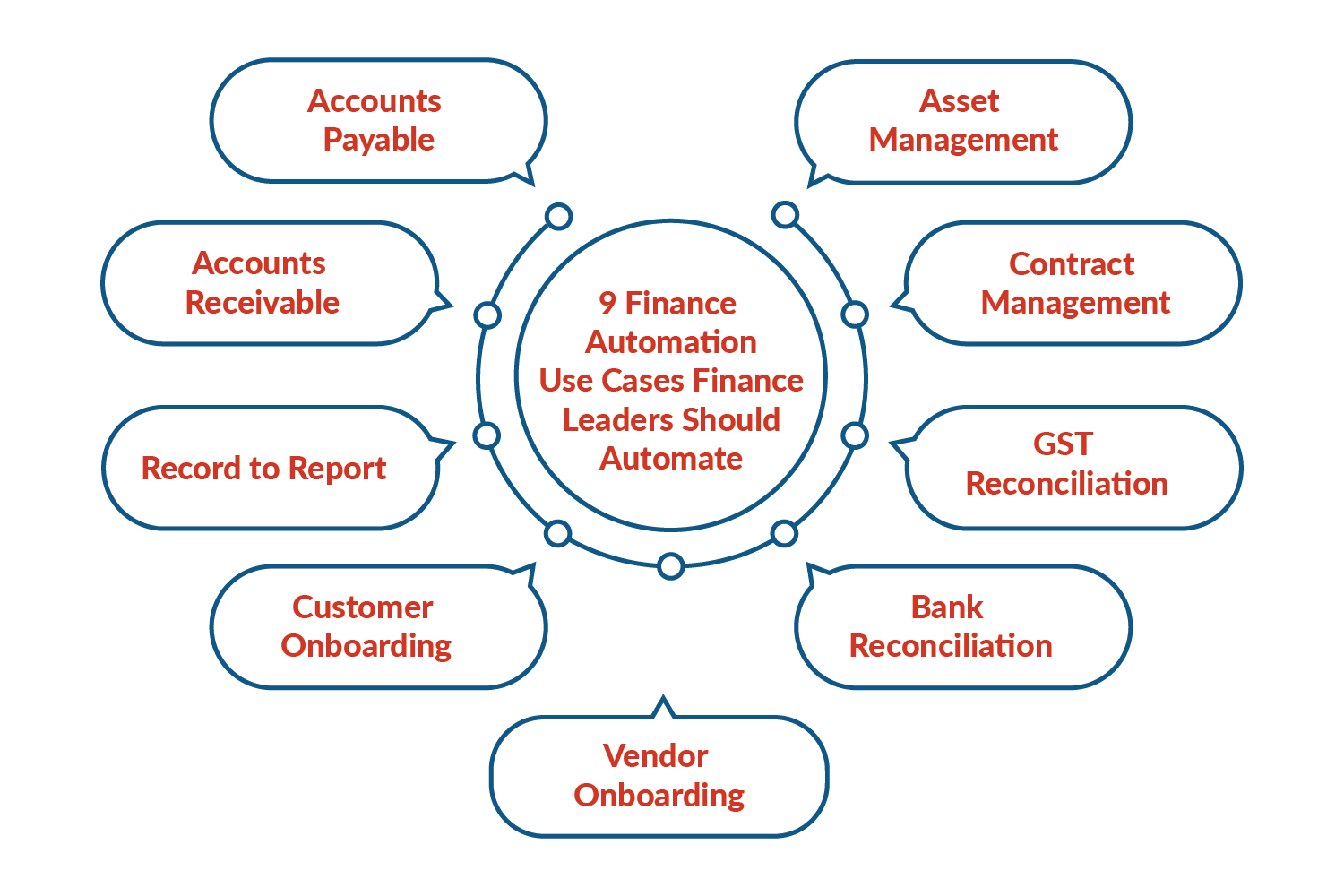Sticking to manual financial processes is like steering a sinking ship in a tech-driven world. Finance automation isn’t just a fleeting trend.
It’s the next big thing in finance. It promises to improve efficiency, reduce risk, increase accuracy, and support strategic decision-making.
Every finance leader knows the challenges of dealing with economic uncertainty, making accurate forecasts, and cutting costs wisely. And that’s where automation steps in to lend a hand.
For finance leaders, like CFOs, automation is a secret weapon. It helps ramp up performance efficiencies. It gives a big boost to cost efficiency. And helps get the maximum value from assets.
But don’t just take our word for it!
In a 2022 Gartner survey on Finance Technologies, 88% reported benefits from Robotic Process Automation (RPA). To name a few, improved efficiency, increased speed and agility, and a big boost to employee productivity.
Now, that’s worth considering, right?
This blog uncovers 9 Finance Automation Use Cases to help finance leaders save costs. The topics covered in this blog are:
- What is finance automation?
- Which processes finance leaders must automate?
- How Finance Automation Benefits Finance Leaders?
- How RPATech can help?
What is Finance Automation?
The finance department has many workflows and processes. These involve different departments, people, systems, and data.
Performing these tasks manually not only reduces the efficiency of the entire system but also significantly impacts performance.
Finance automation is leveraging modern technologies like Artificial Intelligence (AI), Machine Learning (ML), and Robotic Process Automation (RPA) to streamline the process.
Automating finance processes makes the operation smoother. Reduces potential human errors. And saves valuable time for strategic planning.
Finance process automation is a key component in finance transformation. It provides real-time data intelligence and supports decision-making.
Which processes Finance Leaders must automate?
Here are 9 financial processes that finance leaders should automate to save cost:

Accounts Receivable (AR)
Accounts Receivable refers to the money owed to a company for goods or services that customers have received but not yet paid for.
Automating Accounts Receivable can speed up cash flow, enhance customer relationships, and offer real-time insights into financial health.
Accounts Payable (AP)
Accounts Payable represents a company’s obligation to pay short-term debts to its creditors or suppliers.
Automating Accounts Payable can improve accuracy, prevent fraud, and better manage cash outflows.
Record to Report (R2R)
Record to Report is a finance management process that involves collecting, processing, and delivering relevant, timely, and accurate information.
Automation can ensure compliance, reduce closing times, and provide actionable insights.
Customer Onboarding
This process involves integrating a new customer with a company’s products or services.
Automation can significantly enhance customer experience and loyalty while ensuring compliance and accuracy.
Vendor Onboarding
This process involves registering new vendors and getting them approved for business engagement.
Automation can reduce time and effort, mitigate risk, and ensure consistent and fair vendor treatment.
Bank Reconciliation
This is the process of matching the balances in an entity’s accounting records with the corresponding information on a bank statement.
Automation can reduce errors, prevent fraud, and provide a clear view of cash flow.
GST Reconciliation
This process involves matching the data filed by the business with the invoices uploaded by the vendors.
Automation can ensure accuracy, compliance, and timely tax credit claims.
Contract Management
This involves managing contract creation, execution, and analysis.
Automation can provide better control over the contract lifecycle, minimize risks, and improve compliance.
Asset Management
This is the systematic process of developing, operating, maintaining, and selling assets.
Automation in asset management can ensure accurate tracking, better utilization, and compliance with financial regulations.
How Finance Automation Benefits Finance Leaders?
Automation provides clear benefits for finance leaders. It strengthens their capacity to drive strategic initiatives, cut costs, and produce precise financial reports.
Automating finance processes allows finance leaders to move their attention from regular, lengthy tasks to strategic tasks that add value.
This results in better productivity, cost-effectiveness, accuracy, and compliance. It also offers immediate financial insights, efficient risk management, and scalable solutions.
Here are some of the main benefits that finance automation can provide to leaders:
Enhanced Productivity and Efficiency
Finance process automation simplifies repetitive and lengthy tasks, freeing up the finance team for strategic work. These automated systems take care of data entry, invoicing, and report generation, resulting in improved productivity and efficiency.
Cutting Right Costs
Automating financial processes reduces labor costs associated with manual tasks. This helps finance leaders cut the right costs and reallocate the resources to more value-adding activities.
Improved Accuracy and Compliance
Automation reduces the risk of human error in financial transactions and reporting. It ensures compliance with financial regulations by providing accurate, timely, and consistent data processing.
Real-time Financial Insights
Financial automation tools give finance leaders real-time visibility into financial performance data. This allows them to make quick decisions and effectively respond to market fluctuations.
Risk Management
Automated financial systems analyze patterns and anomalies in financial data to identify and reduce risks. This is important for CFOs who need to maintain the financial stability of their organizations.
Scalability
Financial automation systems can scale with growing organizations, handling more transactions and complexity without needing more staff.
Strategic Decision Making
Finance Automation takes care of routine tasks, freeing up CFOs to focus on data analysis and strategic initiatives that promote business growth.
Enhanced Data Analytics
Finance automation gives finance leaders access to sophisticated analytics tools. These tools allow them to pull useful information from financial data, improving their ability to forecast and plan.
How RPATech can help?
Take advantage of our AI-powered financial automation bundle. It saves you time in deployment and is cost-effective.
Find out more about our bundle here: Finance Automation Solutions- Buy Bundle; Save More (rpatech.ai)
If you’re unsure about how AI and RPA can benefit your business, schedule a free half-day discovery call with our experts. During this workshop, they’ll help you:
- Identify the most suitable processes in your business for automation
- Assess the feasibility and complexity of automation
- Understand how to embark on your automation journey with confidence and ease
Schedule your free half-day discovery call here: Book Discovery Workshop- RPATech




